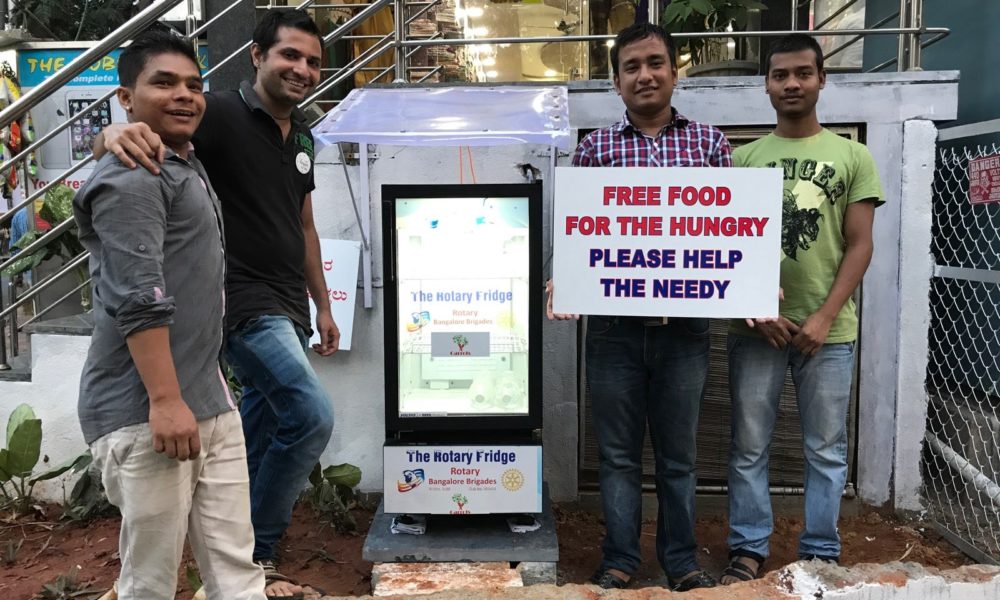



Carrots fills a fridge outside their doors with satisfying vegan meals that are free for ‘anyone who’s hungry’
by Isabel Putinja
“Free food to help anyone who’s hungry,” says a sign written in the elegant swirls of Kannada, the local language spoken here in Bangalore, the capital of the state of Karnataka in South India. This message is posted outside the entrance to Carrots, India’s first vegan restaurant, and next to the sign stands a refrigerator. Pasted on its glass door is its name: The Rotary Fridge.
Over the past four years, these “community fridges” have popped up in busy urban spaces in over a dozen cities across India. Some have been set up outside apartment blocks, or in residential communities, where they’re used by residents to place any leftover cooked food from their kitchens, or fresh fruits and vegetables. The idea is to provide food to those who need it while also cutting down on food waste. The refrigerators keep the donated food fresh and are strategically placed in busy public spaces easily visible and accessible to passersby.
Also dubbed the “fridge of kindness”, this initiative was first launched in Bangalore in 2016 by the Rotary Bangalore Brigades, a volunteer group made up of members of the local Rotary Club. Inspired by the idea, other charities and non-profit groups soon provided their own fridges, and as a result there are probably a dozen such community fridges in Bangalore today.
The original idea of the community fridge was to provide a space where food donations could be made by the public, but a handful of Bangalore restaurants took the initiative to set up their own fridges and fill them with any unsold food at the end of the day.
Susmitha Subbaraju, the manager and co-owner of Carrots, decided to take things a step further. “I first heard about the fridge of kindness in 2017 when another restaurant in Indiranagar (a neighborhood in Bangalore) got one,” she says. “I thought it was a great idea but didn’t know how to go about getting one for Carrots. Then I happened to meet someone from the Rotary Club who put me in touch with the right person.”
Carrots soon got its own Rotary Fridge and stationed it outside the restaurant on the street corner of a busy thoroughfare in the bustling neighborhood of Koramangala, an area full of shops, trendy cafés and eateries. “Once it was set up outside the restaurant we put the word out,” explains Susmitha. “The security guard in our building and the shopkeeper downstairs also passed on the message to people working in the neighborhood.”
“We have very little leftover food at the end of the day because we don’t prepare meals in advance like is the general practice at many restaurants,” she adds. “We prepare everything fresh. So the only leftovers we have are baked goods from the bakery. We generally keep bread only for one day and cakes for two days so after that, they go into the fridge.”
Susmitha Subbaraju, the manager and co-owner of Carrots, decided to take things a step further. “I first heard about the fridge of kindness in 2017 when another restaurant in Indiranagar (a neighborhood in Bangalore) got one,” she says. “I thought it was a great idea but didn’t know how to go about getting one for Carrots. Then I happened to meet someone from the Rotary Club who put me in touch with the right person.”
Carrots soon got its own Rotary Fridge and stationed it outside the restaurant on the street corner of a busy thoroughfare in the bustling neighborhood of Koramangala, an area full of shops, trendy cafés and eateries. “Once it was set up outside the restaurant we put the word out,” explains Susmitha. “The security guard in our building and the shopkeeper downstairs also passed on the message to people working in the neighborhood.”
“We have very little leftover food at the end of the day because we don’t prepare meals in advance like is the general practice at many restaurants,” she adds. “We prepare everything fresh. So the only leftovers we have are baked goods from the bakery. We generally keep bread only for one day and cakes for two days so after that, they go into the fridge.”
“We have about 20 to 25 Good Karma Meals donated weekly to the fridge,” Susmitha reveals. “Anyone who’s hungry can help themselves to one. We don’t monitor who takes the meals but it would be people from the working class who don’t have very well-paying jobs, usually people working as drivers, maids, security guards, or construction workers in the area. The idea is not to judge. It’s about doing good and putting it out there.”
The Good Karma Meal is a way of sharing love, compassion and kindness through healthy plant-based food.
By making these meals easily accessible and free of cost, this initiative addresses urban hunger in India’s high-tech city where the IT professionals living and working here remain a privileged minority. Bangalore is India’s third largest city and the country’s fastest growing. According to the 2010 census, Bangalore’s population increased by 46 percent in a period of ten years, to 9.5 million inhabitants, while today the population is estimated to be 13 million.
Dr. Saravanan R, a long-time vegan and nutrition and lifestyle medicine consultant based in the South Indian city of Kanyakumari, is a strong supporter of the Good Karma Meal. He buys them online on a regular basis so that they can be donated to the Carrots fridge in Bangalore.
“I came to know about the Good Karma Meal through the Carrots website, and I immediately felt like supporting this noble cause as and when I can,” he says. “The Good Karma Meal is a way of sharing love, compassion and kindness through healthy plant-based food.”